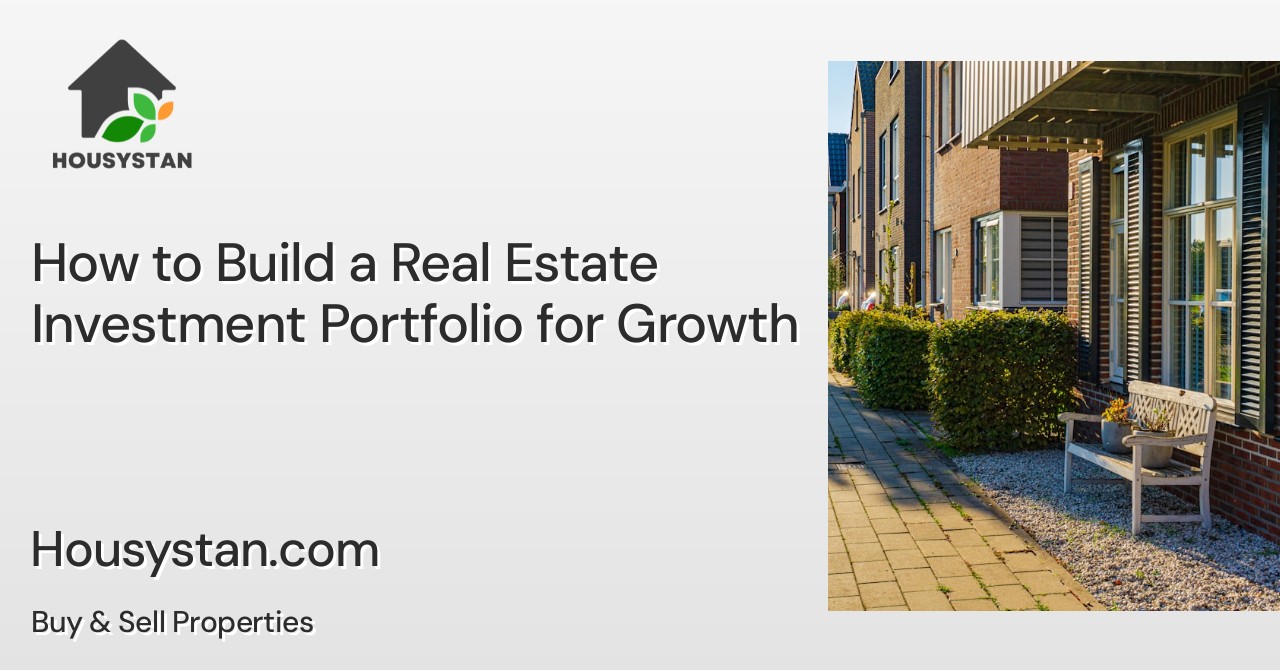How to Build a Real Estate Investment Portfolio for Growth
Read latest blogs and articles from Housystan

The Information mentioned here was last updated on:
29/1/2026How to Build a Real Estate Investment Portfolio for Growth
Investing in real estate can be a smart way to build wealth and secure financial independence. Whether you're a seasoned investor or a beginner dipping your toes into the real estate world, creating a well-diversified portfolio is key to ensuring growth. This guide will help you understand the essential steps to build a real estate investment portfolio designed for growth.
Understanding Real Estate Investment
- Verified Tenants/Buyers
- Unlimited Property Listing
- Zero subscription/charges fee
Before diving into specifics, it's crucial to understand what real estate investment involves. Real estate investment refers to purchasing properties to earn rental income, profit from their sale, or both. Real estate can range from single-family homes and multi-family apartments to commercial properties and REITs (Real Estate Investment Trusts).
Establishing Your Investment Goals
Start by identifying what you want to achieve with your real estate investments. Are you looking for steady rental income, long-term appreciation, or a combination of both?
- Short-term Cash Flow: If you're seeking immediate returns, focusing on properties that generate rental income is a good start. Rental properties can provide a stable cash flow every month.
- Long-term Appreciation: If you're interested in property value growth over time, consider investing in areas with high potential for future development and economic growth.
- Diversified Approach: A balanced portfolio includes both rental income properties and those poised for appreciation to mitigate risk and capitalize on different market conditions.
Conducting Market Research
Research is paramount in real estate investment. Understanding the local market trends can make or break your investment decisions.
- Location: Location is king in real estate. Look for areas with strong economic indicators such as job growth, population growth, and planned infrastructure developments.
- Property Types: Different property types can affect your portfolio differently. Residential properties might offer more stability, while commercial properties can yield higher returns.
- Market Conditions: Assess the current and future market conditions. Are property values rising or stable? Is the rental demand strong?
Financing Your Investments
Finding the right financing is crucial for your investment strategy.
- Traditional Loans: Mortgages are the most common financing options. Ensure you have a good credit score to secure favorable terms.
- Private Lenders: Private lending can be a good alternative if you struggle with traditional financing or need more flexible terms.
- Partnerships: Consider partnering with other investors. This can spread the risk and increase your buying power.
- Self-Financing: If possible, use your savings to make cash purchases which can offer better deals and reduce financial risk.
Building a Diverse Portfolio
Diversification is the cornerstone of building a resilient real estate portfolio.
- Property Types: Include a mix of residential, commercial, and industrial properties.
- Locations: Spread your investments across different geographic locations to minimize market risk.
- Investment Strategies: Blend different strategies such as buy-and-hold, flipping, and rentals to manage risk and optimize returns.
Managing Your Investments
Good management can significantly impact the profitability of your real estate portfolio.
- Professional Property Management: For larger portfolios, hiring a property manager can be beneficial. They can handle tenant relations, maintenance, and day-to-day operations.
- Regular Maintenance: Keeping properties in top condition not only retains value but also attracts quality tenants and minimizes vacancy rates.
- Tenant Selection: Choosing reliable tenants can prevent potential issues such as missed rent payments or damage to the property.
Evaluating Performance
Regular evaluation of your investments ensures they align with your goals.
- Property Value Assessment: Regularly assess the market value of your properties to understand how much your investments have appreciated.
- Rental Income Analysis: Review rental income and expenses. Are your properties performing as expected in terms of cash flow?
- Market Comparison: Compare your properties with similar properties in the area. Are your rents competitive? Are your properties standing out?
Staying Informed and Adapting
The real estate market can be unpredictable. Staying informed enables you to make timely and informed decisions.
- Market Trends: Keep an eye on emerging market trends, such as shifts in buyer preferences or economic changes that could impact the market.
- Legal and Tax Changes: Be aware of changes in real estate laws and tax codes that could affect your investment strategy.
Leveraging Technology
Technology can significantly streamline real estate management and enhance investment decisions.
- Property Management Software: Use software to manage leases, collect rent, and track maintenance requests.
- Investment Tools: Leverage analytical tools to forecast market trends and evaluate potential investments.
Building and Maintaining Relationships
Real estate is as much about people as it is about properties.
- Networking: Build a network with other investors, real estate agents, and property developers to learn and discover new opportunities.
- Professional Connections: Establish relationships with reliable contractors, property managers, and legal advisors.
Continuous Learning
Real estate is a dynamic field that requires continuous learning and adaptation.
- Educational Resources: Regularly read industry publications, attend seminars and webinars to stay updated.
- Mentorship: Seek mentorship from experienced investors who can provide guidance and advice.